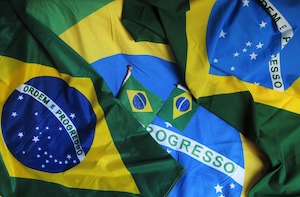Six industry associations in Brazil have together to “vehemently reject” attempts to make the online betting and gaming sector a “scapegoat for the country’s fiscal imbalance.”

The Brazilian Institute of Responsible Gaming (IBJR) and the National Association of Games and Lotteries (ANJL) are among those who have said recent economic developments in the Latin American country could amount to “irreversible setbacks” for the sector.
Sweeping changes to Brazil’s tax system approved in January are streamlining payments by introducing a tax on goods and services (IBS), a contribution on goods and services tax (CBS) and a selective tax (IS).
In a joint statement, the six associations, also including Abrajogo, the Betting and Fantasy Sport Association (ABFS), Aigaming and the Brazilian Institute for Legal Gaming, said the introduction of CBS and IBS would raise the gross revenue tax burden on operators by a further 13 per cent.
CBS and IBS are replacing the current taxes, PIS/Cofins, which factor into the 26 per cent tax burden the organisations say the sector is already facing.
As well as a 9.25 per cent PIS/Cofins tax, operators pay 12 per cent gaming tax and up to five per cent ISS tax, which is a municipal tax.
The statement noted that operators also pay 34 per cent tax on net profits, including 25 per cent corporate income tax and a nine per cent social contribution on net profit, alongside monthly regulatory fees costing up to BRL2m (£).
Additionally, a selective consumption tax on the gaming industry has furthermore been approved and while the rate has yet to be defined, the trade bodies said it could push the overall tax burden on operators to nearly 50 per cent, “jeopardising the economic viability of Brazil’s regulated online gaming industry.”
“International experiences, such as those of Italy and Spain, have shown that excessive taxation in newly regulated markets expands the illegal market, leading to reduced tax revenue and weakened regulatory effectiveness,” the organisations said.
“In Brazil, the risk is already evident: while the regulated market generated around BRL$3.1bn (£) per month in the first quarter of 2025, the illegal market operated with estimates between BRL$6.5bn and BRL$ 7bn (£) per month – amounts entirely outside state control.
“An increased tax burden on legalised operators, therefore, directly threatens the continued presence of companies in the Brazilian market — many of which are already considering returning their licenses and ceasing operations in the country.
“This exit would boost the competitiveness of illegal betting houses, undermining the very goals of the regulatory framework: ensuring tax revenue, protecting consumers, and promoting the integrity of the system.”
“In light of this situation, the undersigned associations reaffirm their willingness to engage in institutional dialogue but vehemently reject any attempt to make the regulated betting sector a scapegoat for the country’s fiscal imbalance,” the organisations continued.
They said measures to rebalance public finances should be built on “structural and sustainable reforms” such as reducing “unproductive expenditures” and expanding formalisation of the digital economy.
“Compensating short-term fiscal losses through disproportionate increases in a sector still in regulatory consolidation undermines the very goals of public policy: guiding consumers toward a safe, legal, regulated, and socially responsible environment,” the statement concluded.
“Brazil now has a historic opportunity to consolidate a mature regulatory model for betting – one with high revenue potential, market integrity and citizen protection. It is essential to avoid irreversible setbacks.”

